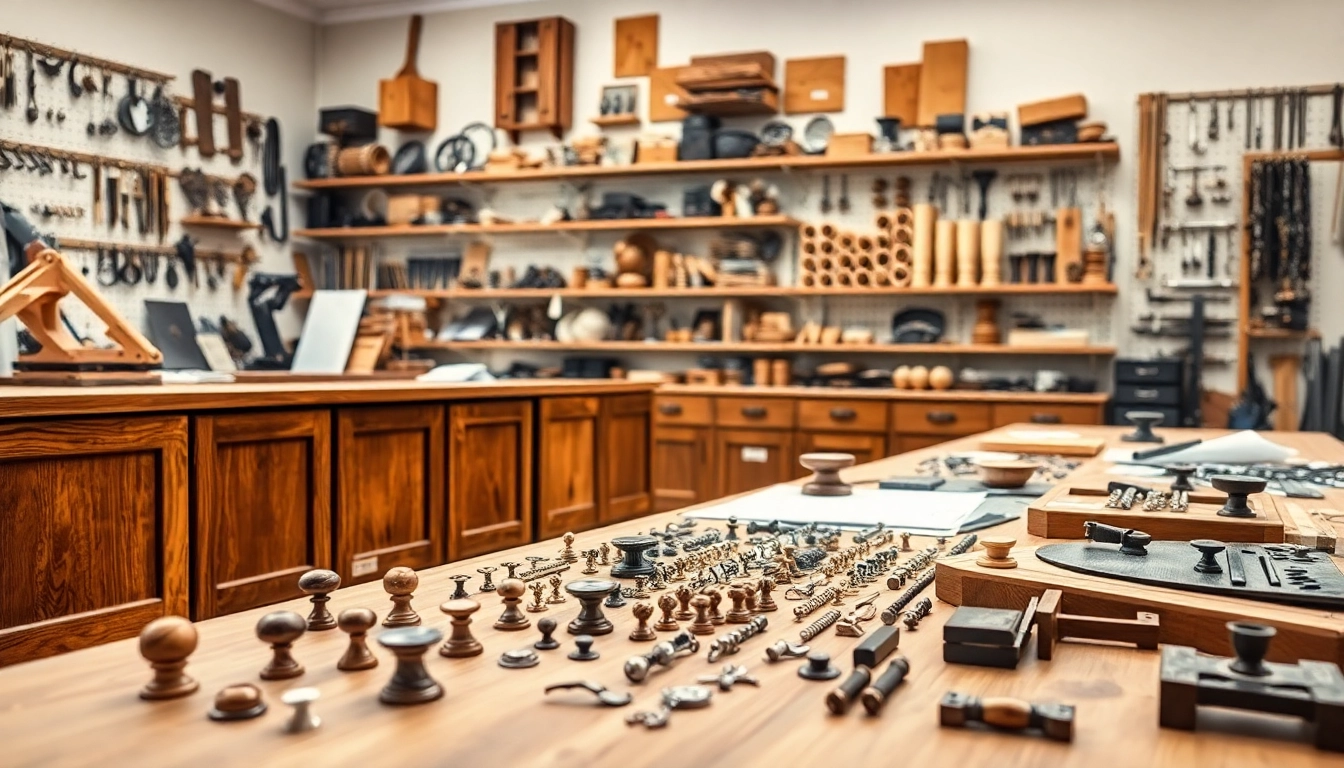Understanding Furniture Hardware: An Overview
When it comes to creating functional and aesthetically pleasing furniture, the importance of high-quality hardware cannot be overstated. Furniture hardware refers to the essential components that enable furniture pieces to perform their intended functions, including hinges, drawer slides, knobs, and pulls. As the backbone of any furniture project, collaborating with reputable furniture hardware suppliers ensures that your pieces are not only durable but also elevate the overall design. Understanding the various aspects of furniture hardware is crucial for both DIY enthusiasts and professional craftsmen looking to create lasting pieces.
What Are Furniture Hardware Suppliers?
Furniture hardware suppliers are companies or distributors that provide the various types of hardware used in furniture making. They supply a wide range of products and components necessary for constructing or upgrading furniture, including:
- Hinges
- Drawer slides
- Cabinet knobs and pulls
- Table legs and bases
- Fasteners and connectors
- Push-to-open mechanisms
These suppliers are pivotal in the supply chain of furniture manufacturing, catering to both mass production industries and individual artisans.
Importance of Quality Hardware in Furniture Design
The quality of hardware used in furniture design can significantly impact the durability, functionality, and style of a piece. High-quality hardware can enhance user experience, providing smooth functionality, while low-quality options may result in frustration and unsafe conditions. Key factors influenced by hardware quality include:
- Durability: Quality hardware withstands daily use, whether it’s a cabinet door that experiences frequent opening and closing or a drawer that bears heavy items.
- Functionality: Superior hardware ensures that furniture behaves as intended, reducing the chances of malfunctioning, which can affect safety.
- Aesthetics: The design and finish of hardware can enhance the visual appeal, aligning with the overall style of the furniture.
Types of Furniture Hardware Available
Furniture hardware comes in various types, each serving a distinct purpose. Understanding these types is pivotal for selecting the right components for a project:
1. Hinges
Whether for doors or lids, hinges are critical for movement. They come in a variety of styles, including concealed, pivot, and continuous hinges, each suited for different applications.
2. Drawer Slides
Drawer slides are mechanisms that enable drawers to extend and retract smoothly. Options include side-mounted, under-mounted, and full-extension slides, catering to varying needs based on the type of furniture.
3. Cabinet Knobs and Pulls
Knobs and pulls provide the necessary grip for opening drawers and doors, available in a plethora of designs and finishes to enhance the overall look of cabinetry.
4. Table Legs and Bases
Functional and decorative, table legs and bases come in numerous styles—traditional, modern, and rustic—affecting both the strength and aesthetics of furniture.
5. Fasteners and Connectors
Fasteners include screws, bolts, and dowels that hold furniture components together, ensuring stability and longevity. Choosing the right type and size is fundamental for assembly quality.
Navigating the Selection Process
Choosing the right furniture hardware supplier is as important as selecting the hardware itself. The selection process should consider various criteria to ensure that the supplier meets your project needs.
Criteria for Choosing Reliable Suppliers
When searching for suppliers, several factors should weigh into your decision:
- Reputation: Look for suppliers with positive feedback from previous customers, ensuring reliability and quality.
- Product Range: A comprehensive range of hardware allows for consistency across projects and often signifies a depth of knowledge in the industry.
- Customer Service: Suppliers offering excellent customer support can be crucial for resolving issues and answering questions during projects.
- Delivery Terms: Fast and reliable delivery ensures that projects are not held up due to hardware shortages.
Assessing Quality and Variety in Product Offerings
Evaluating the quality of hardware products and the variety offered by suppliers can help in making informed choices. Look for:
- Material Specifications: Hardware made from durable materials like stainless steel, brass, and bronze tends to have a longer lifespan and offers better performance.
- Product Reviews: Customer reviews give insights into real-world performance and satisfaction, which help gauge whether a product meets expectations.
- Sample Availability: Some suppliers allow you to order samples, which can be beneficial for assessing quality before committing to a purchase.
Price vs. Quality: Finding the Right Balance
The balance between price and quality is a critical consideration in selecting furniture hardware. While it may be tempting to opt for the cheapest options, it’s essential to evaluate the long-term implications:
- Cost-Efficiency: Investing in higher-quality hardware can reduce replacement frequency, ultimately saving money over time.
- Value for Money: Assess the features against the price to determine if higher-priced items offer a lasting benefit or exceptional design.
- Alternative Options: Sometimes, mid-range options provide an excellent compromise, offering good quality without breaking the bank.
Leveraging Online Resources for Suppliers
The modern era of e-commerce has transformed how customers source furniture hardware, with numerous platforms available for selection. Leveraging these resources can simplify the procurement process significantly.
Top Platforms for Sourcing Furniture Hardware
A variety of online platforms cater to furniture hardware needs, including:
- Amazon: Offers a wide selection with customer reviews and ratings.
- Rockler: Specializes in woodworking supplies, including a diverse selection of hardware.
- Woodcraft: Provides a broad range of tools and furniture hardware for woodworking enthusiasts.
- Richelieu: Leading in specialty hardware with vast inventory across categories.
- Local Hardware Stores’ Online Portals: Many local suppliers maintain online catalogs, allowing for the purchase of familiar brands.
Online vs. Local Hardware Suppliers: Pros and Cons
Choosing between online and local suppliers involves weighing several pros and cons:
Online Suppliers
- Pros: Greater variety and availability of products, generally better prices due to lower overhead, access to customer reviews, convenience of home delivery.
- Cons: Potential for longer shipping times, inability to inspect the product before purchasing, challenges in handling returns or exchanges.
Local Suppliers
- Pros: Immediate availability, personal interaction with staff for questions and advice, opportunity to inspect products directly, supporting local businesses.
- Cons: Limited product selection, often higher prices due to overhead costs, and less competitive on bulk ordering.
How to Evaluate Product Listings and Reviews
When navigating online resources, effectively evaluating product listings and customer reviews is vital. A few steps to ensure a smart purchase include:
- Read Descriptions Thoroughly: Pay attention to specifications detailed in the listings, including dimensions, materials, and intended use.
- Analyze Customer Feedback: Look for common praises or complaints which can signal the quality or potential shortcomings of the hardware.
- Compare Different Products: If applicable, compare similar items to assess price differences and unique features that may affect your decision.
- Check Seller Ratings: On platforms like Amazon, check the seller’s overall rating to gauge their reliability and transaction history.
Trends in Furniture Hardware Design
Design trends in furniture hardware evolve just as frequently as overall interior design trends. Staying updated on these trends can help you choose products that not only perform well but also align with modern aesthetics.
Innovative Materials and Finishes
Modern furniture hardware is increasingly made with innovative materials designed for durability and visual appeal. Some examples include:
- Zinc-Alloy Metals: Often used for knobs and pulls, combining strength and intricate design possibilities.
- Eco-Friendly Options: Hardware made from recycled or sustainable materials is gaining traction among environmentally-conscious consumers.
- Powder Coating: This finish offers durability and a variety of color choices, making hardware more resistant to wear and tear.
Sustainable Options from Modern Suppliers
With an increased focus on sustainability, many suppliers are offering eco-friendly hardware solutions. Benefits of these products include:
- Reduction of Carbon Footprint: Made from sustainable materials, these hardware options minimize environmental impact.
- Durability: Often designed to last longer, reducing waste from frequent replacements.
- Compliance with Eco-Certifications: Many sustainable products meet strict guidelines helping to achieve green building certifications.
Custom Hardware Solutions for Unique Designs
Many modern furniture projects demand bespoke solutions. Custom hardware options allow designers to achieve unique aesthetics and solve specific functional challenges. Some possibilities include:
- Tailored Dimensions: Custom components can be designed to fit specific measurements, ideal for unique furniture shapes.
- Unique Finishes and Colors: Get hardware crafted in specific finishes that align with your design requirements.
- Specialized Functional Features: Creating mechanisms or connectors that fulfill particular requirements that off-the-shelf options may not satisfy.
Maximizing Your Experience with Suppliers
Building a strong relationship with hardware suppliers can streamline future projects and enhance overall satisfaction. Consider the following approaches:
Building Long-term Relationships with Suppliers
Establishing a trustworthy relationship with suppliers can lead to benefits such as:
- Better Pricing and Discounts: Loyal customers often unlock bulk pricing or exclusive deals.
- First Access to New Products: Suppliers may communicate new and innovative offerings to trusted clients first.
- Personalized Service: A strong relationship means suppliers may cater to your unique style and material preferences.
Tips for Negotiating Prices and Contracts
Negotiation skills can be crucial for securing favorable terms. Here are some tips:
- Do Your Research: Understanding market prices helps you negotiate effectively and identify reasonable price points.
- Build a Rapport: Establishing trust can often lead to better deals as suppliers become comfortable with you.
- Be Open to Alternatives: If the required hardware fixture is not available at desirable terms, be open to considering alternatives that might suit your needs.
Resources for Follow-up and Customer Support
Effective communication after the purchase ensures satisfaction. Leverage these resources:
- Supplier Websites: Often include customer service contacts, FAQs, and support chat facilities.
- User Manuals: Many suppliers have downloadable manuals that provide essential information for installation or troubleshooting.
- Warranty Information: Understanding warranty agreements can provide peace of mind and keep you informed of replacement procedures if needed.



